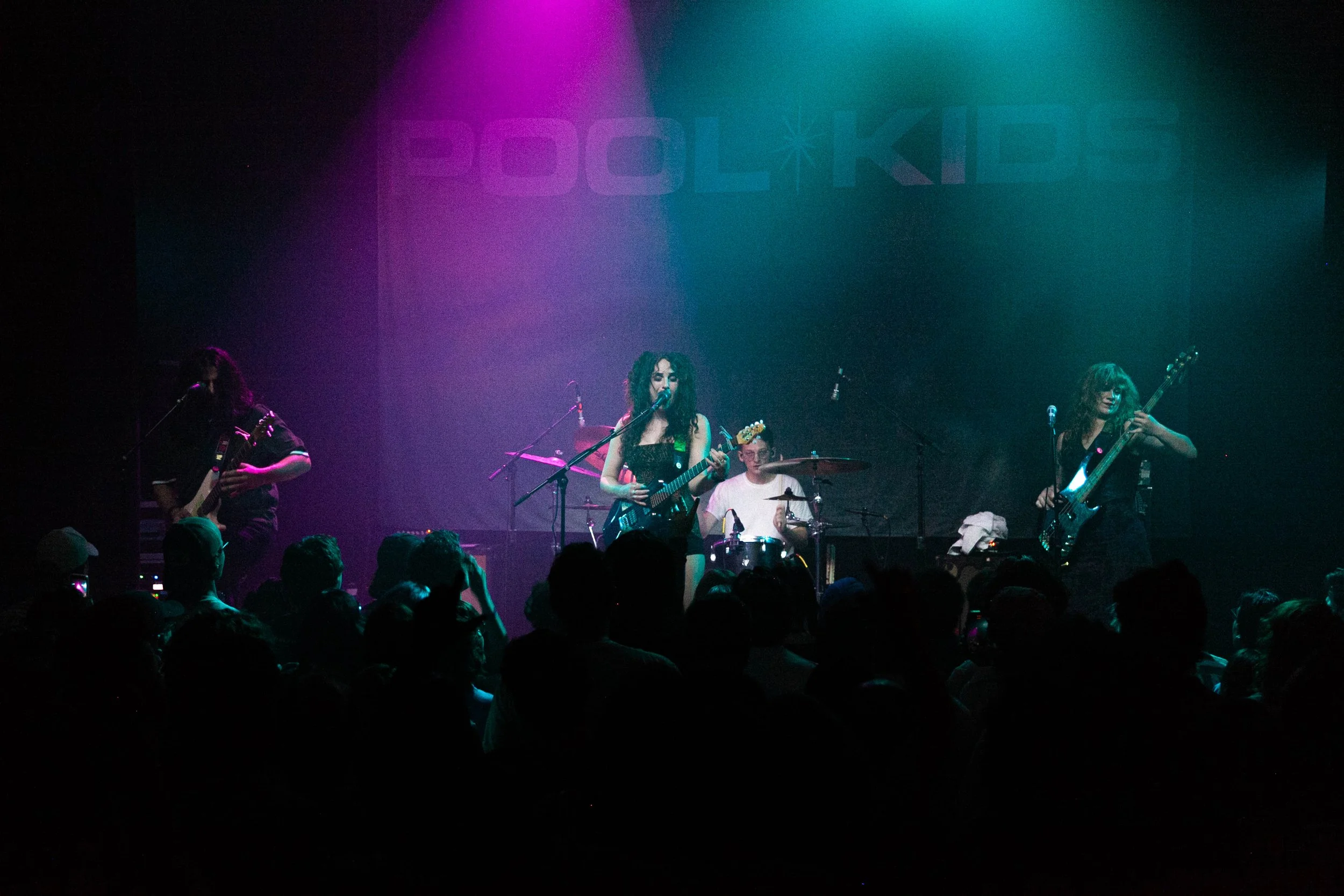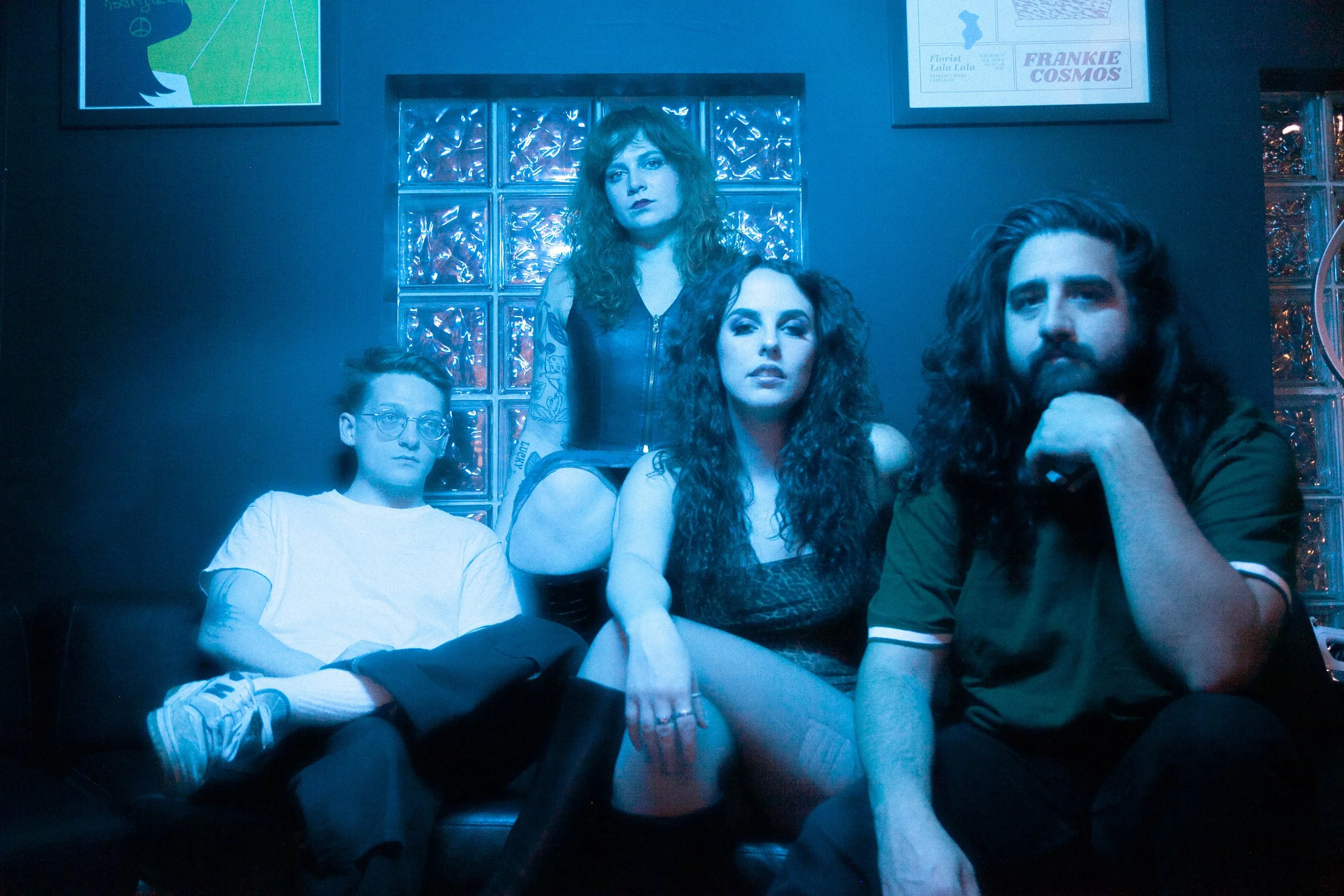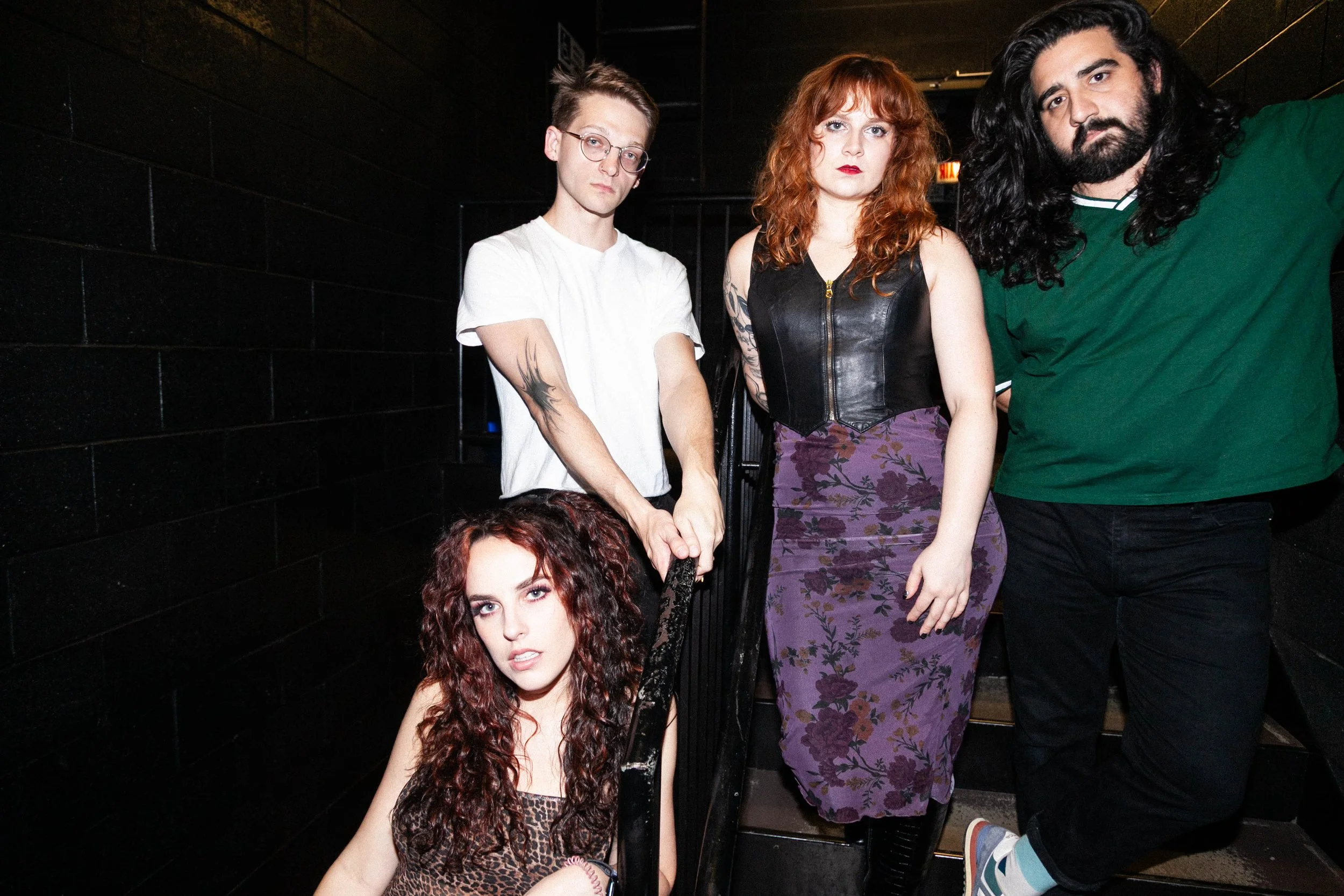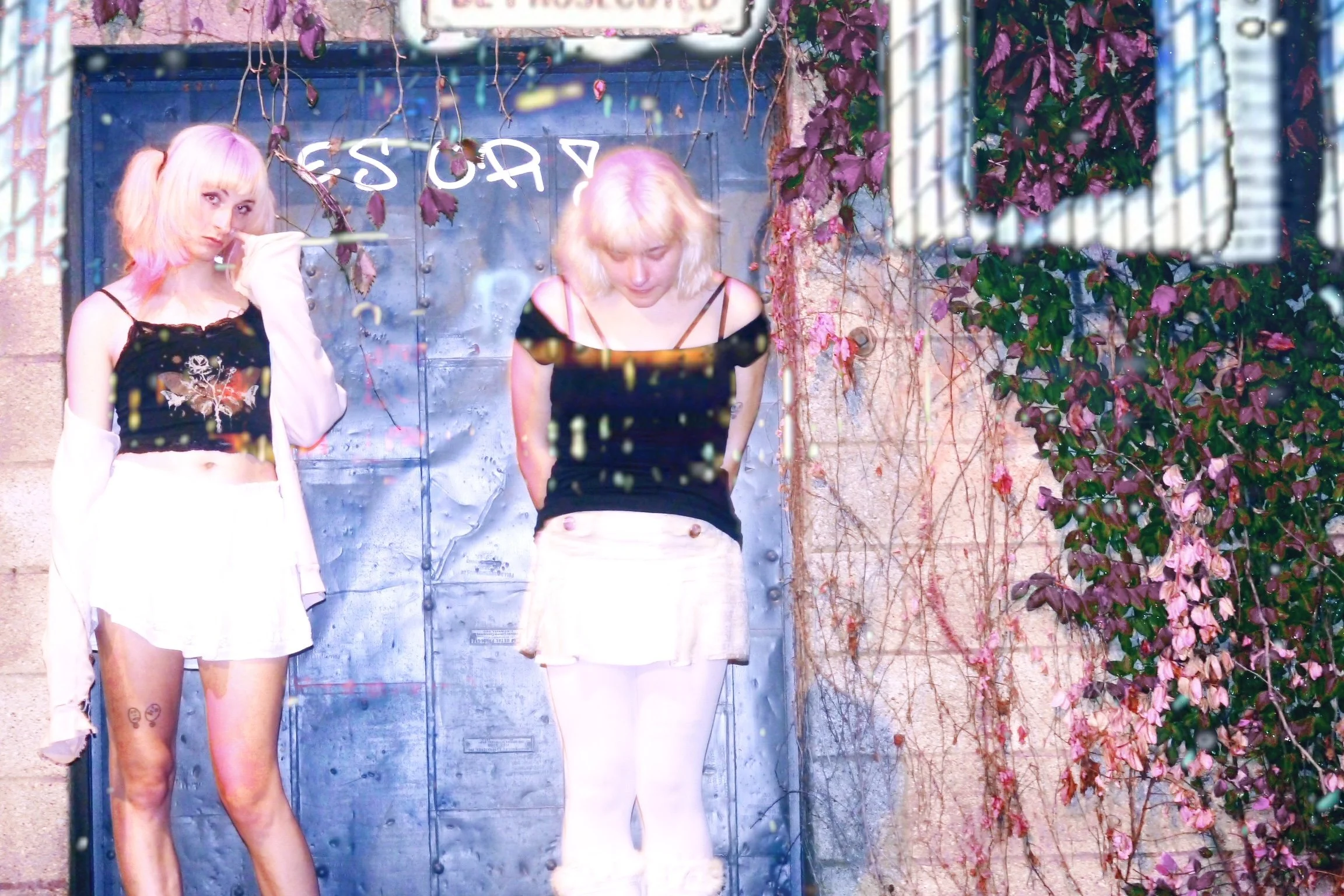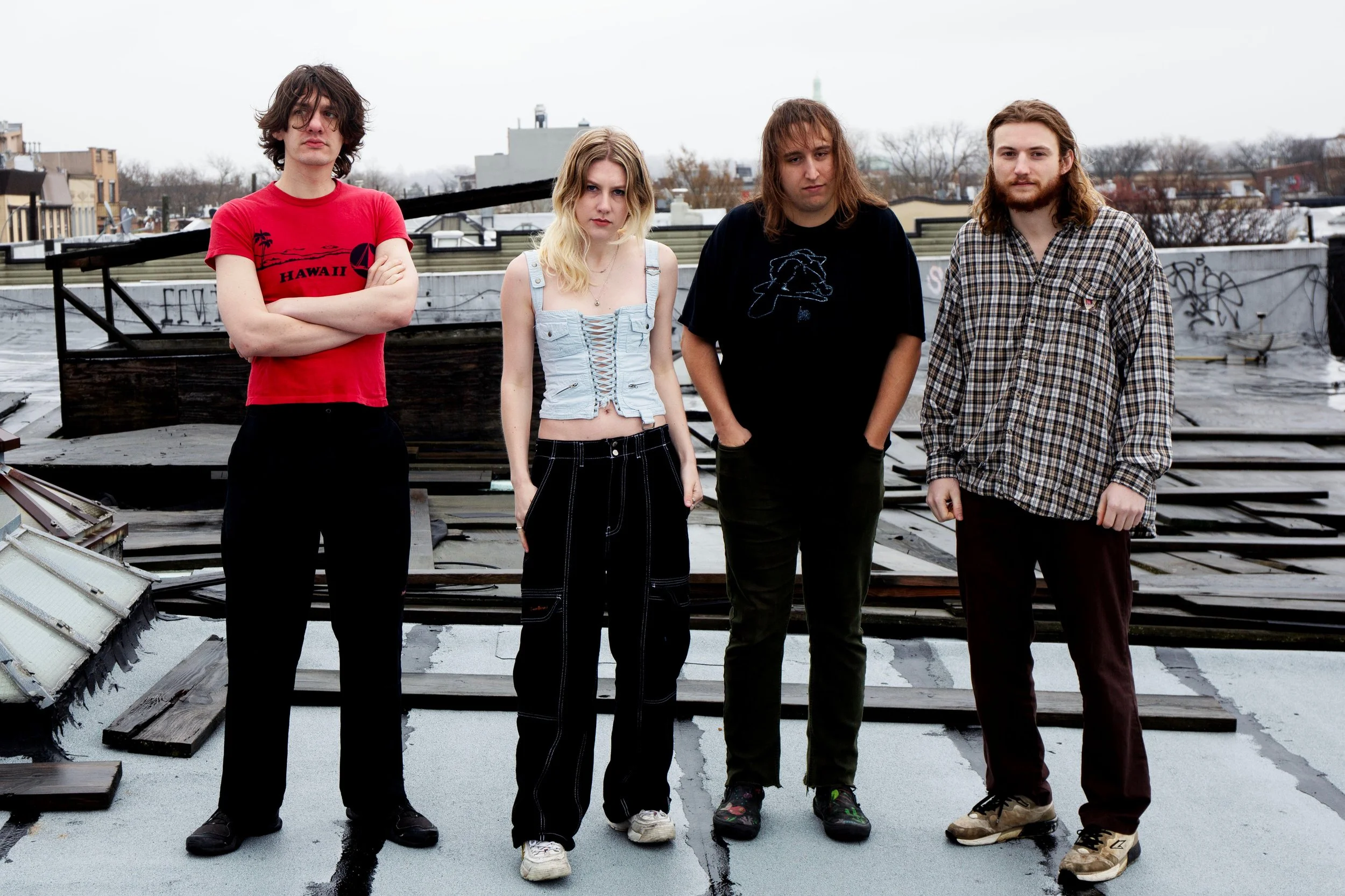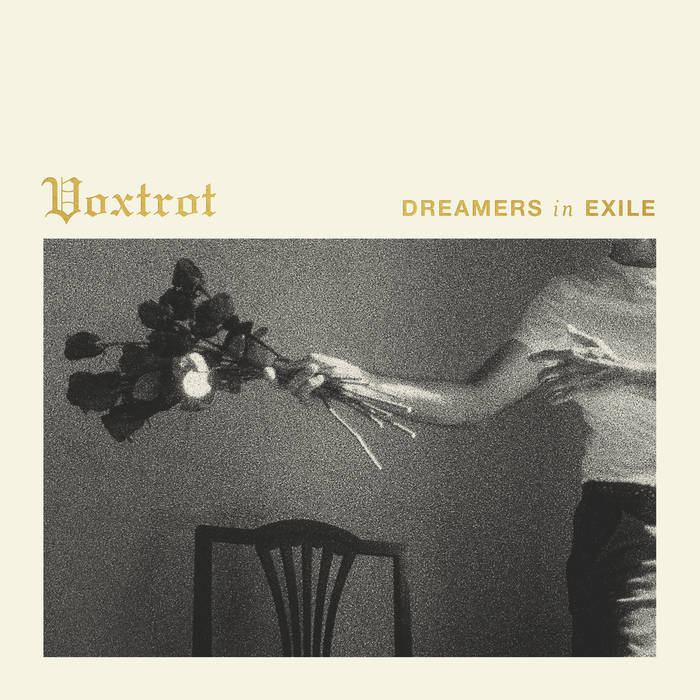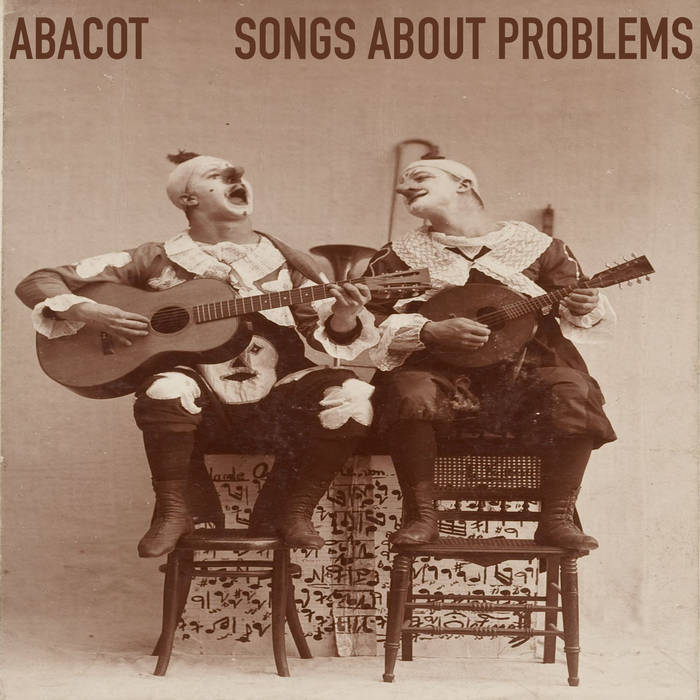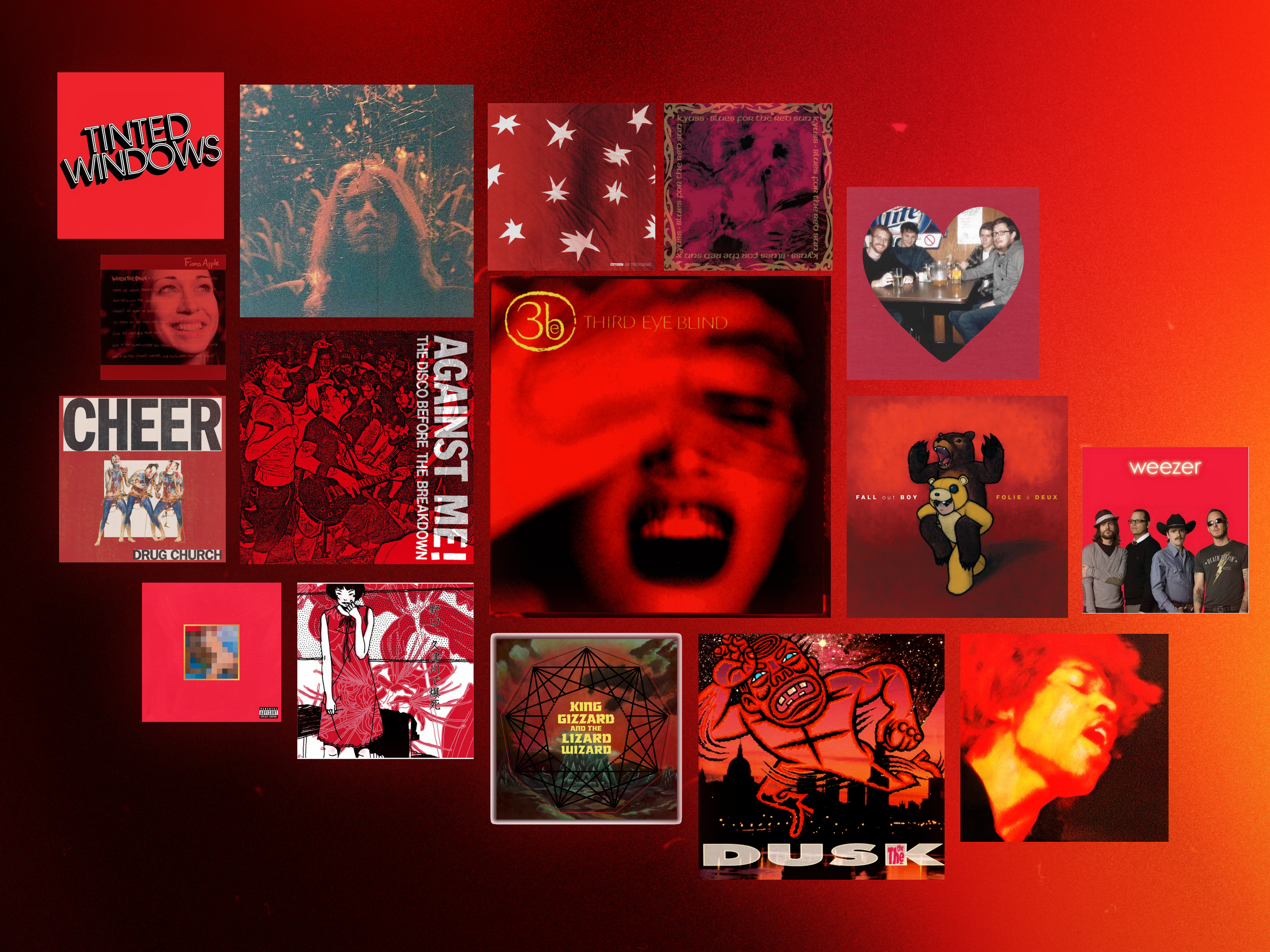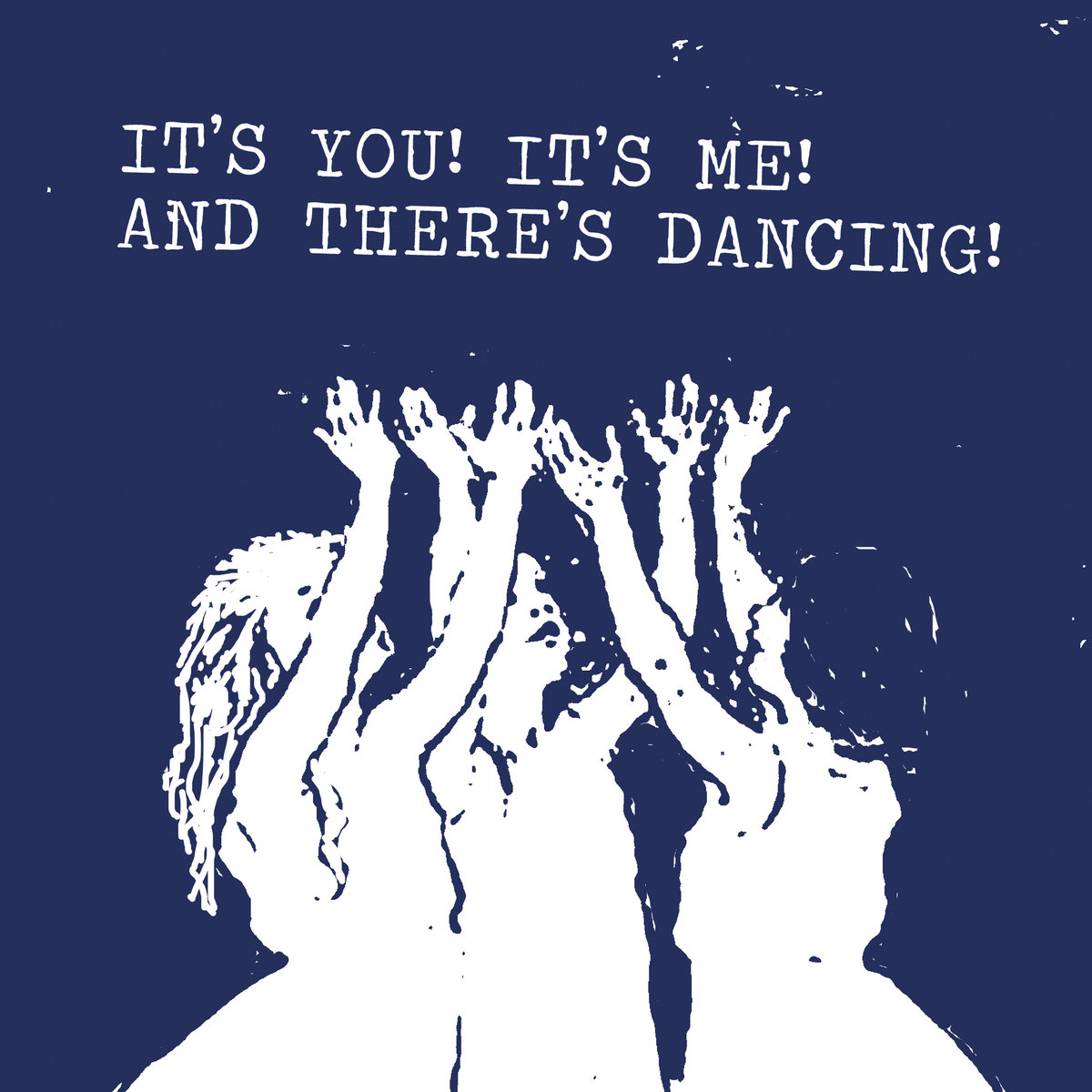Radicalizing Self-Love: An Interview with JER
/Bad Time Records
Over the last several years, Jeremy “Jer” Hunter has become a prolific fixture in the New Tone ska movement. They have been a viral sensation countless times, racking up nearly 40 million views across YouTube and TikTok for crafting ska covers of popular songs under the moniker Skatune Network. A true multi-hyphenate and one-person band, in the average Skatune video, you can see Jer playing trombone, trumpet, guitar, bass, sax, and singing – to list a handful of their proficiencies.
Jer has wielded these talents on numerous records and on stage for acts such as Jeff Rosenstock, Fishbone, We Are The Union, The Bruce Lee Band, and many other notable names in the ska and punk scenes. In recent years, Jer has begun putting out their own original music as JER – releasing their first LP, BOTHERED/UNBOTHERED, in May of 2022 and their sophomore album, Death of the Heart, in August of 2025.
Jer capped off the end of last year not only with the release of their new album, but with plenty of touring to keep their hands full. This recent bout of time on the road included a jaunt to Japan, as well as stops at FEST in Jer’s home state of Florida, No Earbuds Fest in Southern California, and MAGfest up in Maryland earlier this year. Now that they’re back from trotting the globe, I had the pleasure of sitting down with Jer to chat about these enthralling live shows before thoroughly delving into the creation, inspirations, and broader meaning behind their thought-provoking and politically-charged new album, Death of the Heart.
This interview has been edited for length and clarity.
SWIM: How has touring, MAGFest, FEST, and coming back from all that been?
JER: It's been really good, the back half of 2025 was very eventful. We went to Japan again, and this was the first time for the JER band. Those shows gave me a new reason to play music live. The love and the energy was so revitalizing. Then FEST had the same energy. So many people that I love from across the music industry, the music world, all the music scenes, typically they're at FEST.
So, to feel that love again, it fueled me. We ended our year in SoCal at No Earbuds Fest, and SoCal showed up. It was just banger, after banger, after banger. All the touring has been great, but that last run of shows in particular, the energy was through the roof.
Earlier this year, there was MAGFest with Rebecca Sugar. Steven Universe is such an important show to me – especially the music. I probably wouldn't be doing Skatune Network if it weren't for Steven Universe. What Aivi and Surasshu were doing on that show inspired me to open Logic and start making music, so that full-circle moment was very cathartic.
SWIM: Crazy full circle. My friends Sierra and Carina went to MAGFest too, and they were sending me videos of the Rebecca Sugar show, and I was like, “Oh, there's Jer in the back on the Trombone!”
JER: I didn't really talk about it a lot, because I got doxxed around the same week that they announced that. Far-right Twitter was having a field day. I think if I announced that I'm performing with the creator of the Gay Space Rocks show as far-right Twitter was dogpiling on me, that might just add fuel to their fire. I kind of just didn't post about it, and then I went on tour and realized I'd never posted about it, so that was a surprise to a lot of people.
SWIM: ‘Joke’s on you. I'm literally never home!’ [Laughs]
JER: Yeah, right. Good luck showing up at my door, no one’s here!
SWIM: My friend Avery was in a couple bands that were at No Earbuds Fest, and that seemed really cool.
Something I also never thought about until the last several years was how big ska is in Japan and how many ska bands there are, like ORESKABAND. It's so cool that it's such a big pocket in Japanese music culture.
JER: Yeah. I've gone twice now: once in October 2024 with the Bruce Lee Band, and then this past October again with the JER band. Japan feels like it is almost 20 years behind when it comes to pop culture. The best way I can describe it is how there's a bunch of people who are nostalgic for the 80s, but they were literally born in the 90s, so they have this nostalgia for the 80s through seeing 80s media. I feel like Japan's the same way: they're seeing ska, punk, and alternative through the media's gaze, and now they're recreating it years later.
They consume so much American culture, and they might not understand all of the reasons why that American culture happened, but they're still recreating it in their own way. On top of that, their culture just values music and art way more; it's more accessible there. It's the perfect combination of those factors that have allowed Japanese ska to be so big, but also alternative music in general.
SWIM: Absolutely. That's how I've always felt about K-pop, too, where it's a mirror reflection that keeps going back and forth between Korea and America. If you look at J-pop, Hikaru Utada’s career, their 2000s stuff sounds like the 90s. It's just a cool pattern.
Something I’ve always admired about you is how prolific you are and how much stamina you have to put out content, be in so many different bands, and do the marching band. Where do you feel that initiative to do all of those things comes from?
JER: Part of it is a love for the craft. It's that mantra that's capitalist propaganda of "Find a job you love, and you'll never work another day in your life,” when the reality is, it is work. I love music, and I'm more inspired to create a ska cover, play music, or teach marching band than I ever was to flip bacon at Waffle House. It's easier for me to get out of bed knowing I can make music than it is to make meat as someone who's vegan. [Laughs]
Photo by Rae Mystic
It's a very volatile and uncertain profession. I'm grateful people back me up and support me with Patreon and buying my music and merch. That is the only reason I'm able to do this. Even if I'm not feeling motivated, it helps knowing that people love it when I share a cover, or seeing the comments from people really hyped on it. Whether it's people telling me at shows or people showing up to concerts, anything like that, those are the things that make me want to keep creating.
Sometimes there are days when I'm not really feeling it. It might take me a little longer to get it done, but there's also the time constraint: I have a month before I go on tour, and I need to get X, Y, and Z done. Sometimes the pressure of that just forces me to get things done. There always comes a point in every cover, even if it feels like I’m dragging my feet, where I have to get this done. By the time I'm halfway through the process, I start getting hyped on it. ‘Oh, this sounds really cool, and I know people are going to really dig this!’
The other work that I do are kind of my anchors. Every summer I'm doing band camp, every fall I'm doing marching band competitions, and every October is FEST. Those things ground my life into some sort of reality where, during all the time in between, I could probably make three months’ worth of covers, and then I'm not making covers when I'm on the road. It’s a lifestyle where you have to be adaptable. I once saw someone say that they gave up their 9-to-5 to work 24/7, and damn, that's so true.
The Undertale cover record I did was purely out of passion, but then [Toby Fox] used it for a stream. I did not make money on that at all. Even after selling records, I only broke even because I paid the artists to record on it and the people who made the art. I wasn't expecting them to compensate me for making that cover record. I really didn't make money off of it, and then two years later, that money came back.
There are some months where I worked all day, every day, for months at a time, and I made very little money. Then there are other months where I can go on tour, and that work I put in is still sustained. If I'm not posting, the Patreon does go down gradually. If I'm posting, it goes up gradually. So, there still is a consistency that needs to be there. There's a give-and-take with it.
SWIM: Exactly. One of the things I think that you’re known for in the music industry and in general is how outspoken you are about social media and the algorithm. Being a content creator and a musician while under the constantly changing social media culture we're in right now, what is your general approach to tackling that uncertainty?
JER: My whole philosophy lately for myself and what I try to internalize is moving back to logging off, unplugging, the same way that there are people who are ditching Spotify and streaming altogether. People are starting to buy CD players again and build up their physical collection. I just bought a DVD player, because I went to watch Steven Universe, only to find out it's not on HBO Max, it's on Disney+, which is ridiculous. I just want to watch my show and don't want to give Disney any money. I just bought the DVD boxset, and now this can never be taken away from me, unless I lose it or something. It's something I've been meaning to do, but how do I translate that to music?
I've been building an email list since last year, basically harassing anyone who joins my TikTok live streams to sign up. We announced this tour, and ticket sales have been better than any tour we've done so far. Some people say they don't want to join the email list because they get so many emails. I have multiple email accounts, so when I'm looking for this information, I'm not digging through spam. I'm encouraging people to really lean into that; being intentional about the content that they're taking in, especially in an era of AI slop on the rise.
Social media feeds are so overwhelming, and I don't blame people who might see me, but then see like 500 more posts that day. I can't even remember the last three posts I saw on social media. I have to treat everyone like that. Someone might've seen my tour announcement, someone might've seen my new record, someone might've seen my last cover, but they probably saw a million posts after that and forgot about it. You don't forget going out to a show, unless you're blackout drunk, then you forget. [Laughs]
If you're going out to a show and you're actively engaging, you're not going to forget that. If you go up to the merch table and meet the artist, you're not going to forget that. An email with very specific information that you'll only see on that email list. So for me, it’s finding the quality people within the quantity; find the people who want to be there and reach out to them. The people who see all my posts, who constantly see me repeating the same things – for every one person like that, there's a thousand people who may have followed me for years, and they've never heard that I make my own music, or that I'm on tour, or that I have a new cover. I've been touring, and it's not even your fault; you just haven't seen it because I've been pushed out of the algorithm, not because the algorithm is evil, but because there's an oversaturation of content. On top of the algorithm being evil. [Laughs]
SWIM: Absolutely. I'm stoked to hear that you're getting so much love for the Seattle date of the Bad Time tour. I'm glad people are seeing that and buying tickets because, like you've said in your videos, we are the farthest away from you right now. So that means people are talking about it, sharing it, and actually seeing that information.
JER: No, Seattle's been great. Honestly, most of the more remote places, like Denver, have been great. The Northwest is not used to bands making it through as much as Chicago, New York, or Philly. Those cities are also doing great, but Seattle, by far, is the best one. Also, a lot of my videos do well there. When I checked the top cities, Seattle has always been one of those. We played Seattle on the Fishbone tour, and that was by far the best show of the tour for us. I'm really thankful for that.
SWIM: You mentioned AI when you were talking about the algorithm, and I was curious, as an artist who is so vocally anti-AI, what's getting you through this AI slop era we’re in?
JER: Yeah, the whole AI thing is really annoying in general. Even most of the time, it's just slop in every sense of the word. It looks bad, it sounds bad, but it's gotten to the point where it's indistinguishable. It's still slop, it's just slop that looks better. The point of it being slop isn't that it looks bad; it’s that no effort went into creating it. What makes art cool is that somebody couldn't express something that they were feeling, so they developed the skill to express that thing. With AI, somebody felt something, but instead of developing any sort of skill, they just made a computer do it.
It's getting to the point where more people reject AI than not, but these algorithms are just shoving it down our throats whether we want it or not. Bandcamp announced that they're banning AI, and I haven't seen a single person say that's a bad thing. Moves like that are starting to show that there is a market for it. I see a future where you might start seeing indie artists selling DVDs. I've seen some Kickstarters where they offer that as a perk, but you might see more of a push. I already see it on TikTok, where artists are really pushing CDs and CD players. Vinyl is coming back for all the people who didn't know that it never went away. Bands have been selling records forever, but CDs are also getting a huge push right now. I think people will move more towards physical media and become more intentional about what they consume.
If every TikTok or Instagram Reel or YouTube short is a minute, you can at most watch 60 of them an hour, and that's assuming you dedicate a full hour to doing that. So, how much content is going to get on there to the point where you can't even watch stuff? You can just get offline and go directly towards who you follow to find out about stuff. I think that's where the future is moving. I can already see that happening with people deleting or getting off of Instagram and signing up for email lists.
SWIM: When I deactivated Twitter, I had that nostalgia of “This is where I met so many of my music friends and this has offered me so many opportunities,” but now it's this soulless reflection of something I used to like, and it's not even serving me anymore. So that made it easier for me to push it away. The same thing is happening on Instagram right now. The same thing's happening on TikTok.
pulses. is a band I always bring up, but they just released a dual-CD/DVD for their 10th-anniversary show from last year. When I was talking to Kevin about that last year, he said, “You know, I don't know if we're going to be able to do it. It's hard, and I'm figuring it out all by myself, and I don't know if we're going to make money off of it, but we're going to put it out there for people.” People need to be taking that risk and offering that, so people have shit to put on their shelves and in their collections.
JER: I agree, 100%.
SWIM: Death of the Heart has been out for months now. How's the reception been?
JER: It's been great! Death of the Heart came out in August of 2025, and especially in the back half of the year, I feel like every week there were banger records coming out. Pool Kids dropped their record the same day as Death of the Heart. Kerosene Heights dropped their record that day as well. We went on tour with The Bouncing Souls over to Japan and back to FEST. By the time we got back to FEST, people were singing the new songs more. Even going to California in December, people knew the new songs more than the older ones. The general consensus is that people have really latched onto Death of the Heart a lot quicker, which is really cool.
It wasn't a record that took over the world, but I think it's really dope that, within the following, people are really loving it. Bands often put out a second record and people say they like the first one better, but I'm finding a lot of fans saying it's been a step up. People who are finding me through Death of the Heart are now finding BOTHERED / UNBOTHERED retroactively. Death of the Heart has been, without a doubt, more successful on social media. Every time I post a video that does well on Instagram or TikTok, I gain a lot of followers, but I also attract a lot of other cool people. Topaz Jones is a rapper I found a couple years ago, and he followed my page, which is cool. I'm noticing a lot of rappers, hip-hop artists, R&B singers, and jazz artists are finding it. I think it's a testament to how good music is good music. People are really resonating with that.
It's also been 100% DIY; I'm not really getting a publication push from the music industry. I'm not getting features on huge podcasts or reviews. It's literally word of mouth. The fact that the social media push and the word of mouth have gone this far has been really cool. There's so much room to grow with the record. People might come out to the Bad Time tour, and they might not have listened to the record yet, but then they're going to see the band absolutely tear it up, because the JER band rips. I'm excited for people to hear these new songs and see the band’s energy.








SWIM: That's awesome. I think all DIY and smaller artists are feeling that inundation of music. If you're someone who tries to follow music as much as possible, the weekly deluge of new albums, EPs, and singles can be disheartening if your mindset is to be on top of everything as it's released. Something I try to tell artists when they're feeling discouraged is that their music isn't going anywhere. Just because a week has passed since it was released, people go back and find records literally all the time. Don’t be so focused on, “I have this finite amount of time to release my music and talk about it. Otherwise, it'll never be heard.”
JER: Yeah, the music industry is just like that. “You need a new record in two years.” I put out the record six months ago. I'm supposed to be 25% through this whole era before I put out the next record. I don't think a record's coming in the next year and a half, but there's nothing wrong with that.
There's this one bit from Family Guy: it's some dude in jail watching TV, and he’s like, “If I haven't seen it, it's new to me.” I'm pretty sure you know exactly what scene I'm talking about. [Laughs]
SWIM: Yeah. That's so funny, I have that Family Guy vocal stim, I could recite the inflection verbatim. [Laughs]
JER: But it’s so true! I see videos that went viral on Tumblr and Facebook 15 years ago going viral on Instagram now. That song “Chinese New Year” is another great example. That band, SALES, put out a five-song EP, they toured a little bit, they weren't going anywhere, they broke up. Five years later, Chinese New Year went viral on TikTok, they went up to 3 million monthly listeners on Spotify, and then that band literally came back. They weren't on TikTok posting, that was just organic.
Someone with 10 million subscribers on YouTube could find and talk about Death of the Heart, and then as a creator and as an artist, it's my job to always be ready. That's what I've learned after 10 years of doing Skatune Network. I could wake up tomorrow with an influx of followers, but are they seeing what I want them to see? Are they seeing my tour dates? My new music? Is it easy for them to find? You never know what the future's going to be.
SWIM: What are some of the musical or non-musical media influences that went into Death of the Heart?
JER: Normally, I always have these references sitting around, but Death of the Heart ended up not having any. That's just naturally what happened. When I first started doing JER, “R/Edgelord” uses a sample from Arthur with Buster being like, “You really think someone would do that? Just go on the internet and tell lies?" If you didn't grow up on Arthur, that's something that wouldn't necessarily be on your zeitgeist. “Say Gay or Say Goodnight” sampled the series finale of The Owl House. Most people my age weren't watching that show unless you were really into animation. Going into Death of the Heart, that record was formed at a time when I was finding a lot more real-life influences. At the end of “What Will You Do?” there is a sample from a two-hour news report about the MOVE bombing, with the citizens of that neighborhood airing their grievances about how the police handled that whole situation.
While writing this record, I was doing a lot of reading, learning, growing, and expanding. There’s that Jamie Baldwin quote where the record's name comes from. There are more nuanced, subtle influences. I believe it’s “Cult of the Lonely” talking about love being a contraband. That's an Assata Shakur quote. “Claim Yr True Feelings, Wounded Child” is actually a paraphrased Bell Hooks quote, talking about love and the action of love being a verb and not a noun. There are six pillars that she talks about, like respect, communication, care, and nurture. “The death of the heart” is the absence of love, and with things like racism and sexism, bigotry, and transphobia, you cannot be a loving person and hold those in your heart, because you're doing the active opposite of love. The action of love, of caring and respecting and communicating with people.
The flip side of “the death of the heart” is not allowing yourself to grow. That's where the record ends. You can't say you're about growth and care if you're not allowing yourself or others around you the space to learn, grow, and care. That's what revolution is. That's what being radical is. It's recognizing that we have been raised by a system of harm and doing the work to unlearn that harm and repair it with love, care, accountability, and healing. If you're not willing to allow that to happen, then that is “the death of the heart.”
I took a sample from The Truman Show, which I think is the only actual media reference. The whole movie is about how Truman is in a TV show, and everyone knows about it except him. He's having a nervous breakdown, because he's been made into a product against his consent. He's trying to figure out what's going on, and people know, but they don't care because they just want to be famous and want money. His wife in the show is like, ‘You seem stressed! Product placement!’
SWIM: That was one of my favorite memes for a while. The world is burning around you, but all of these content creators are putting up the Mococoa drink, and he’s like, “What are you talking about? Who are you talking to?”
JER: I thought it'd be cool to splice that up over a beat, because the whole front half of the record is, “The world is burning and this person is just promoting a product and acting like nothing's wrong and there very clearly is something wrong.” I first got the idea when I was watching that movie again, I heard the “Do something!” and I needed that to be how that sample ends. In the movie, she's calling out for the film crew to do something to save her. In reality, we collectively need to do something.
SWIM: BOTHERED / UNBOTHERED came out square in the middle of the Biden presidency. We shift into this complacency mode when there's a liberal president, but when we have a sitting dictator president, people are angrier. Do you feel like Death of the Heart is a heavier record, especially with the Omnigone feature and the themes? Where is that coming from?
JER: It definitely is a much heavier record, both in its tone and the actual music itself. Hardcore and heavy music has always been an influence of mine; I just wasn't really writing in that style quite yet with BOTHERED / UNBOTHERED. That record was also me figuring out my own sound. One of the first tracks I demoed on Death of the Heart was “What Will You Do?” and I was like, “There's no way this could be a JER song, it's way too heavy.” I was listening to a bunch of Gouge Away, Turnstile, and Soul Glo. As the record started coming together, it felt almost like a disservice to leave it out. At a certain point, I was like, “I'm Jer, so if I write it, it's the JER sound.” It's my music.
I remember when Biden won, I made a post saying, “If we treat this like a victory and celebrate, we're going to be saying good morning to President Trump or President DeSantis in 2025.” Especially being a Floridian, watching Florida go through what we've gone through, everything that's happening everywhere has been happening to Black America for so long.
People are already making the parallels now. The ICE raids, they're slave patrols. They're doing what slave catchers were doing. Black people have been saying this. That's where “What Will You Do?" came from, speaking of that song and where the record starts getting heavier. That song was inspired in October of 2023, when I was posting a lot about Palestine, and somebody was like, “You know, you're really worried about the Palestinian struggle, but why aren't you posting like this about the Black struggle? Shouldn't you be focusing on the people in your own backyard who are your people instead of this other entity?” My response is: that is the Black struggle. That person asked me, “What are you going to do when they do what they're doing to Palestine in America? You're so focused on Palestine, but you're not worrying about America.” I said, “Dude, do you not realize when I see Palestine being bombed, I see the MOVE bombing. When I see ICE detaining people and throwing them in prisons and tearing families apart, I see the slave patrols who tore families apart and auctioned children off to be sold into slavery. When you see the prison industrial complex, you see chattel slavery. Anything that is happening to any marginalized group of people, it happened to Black people first. That's something that became a core tenet of Death of the Heart.
Even amongst progressive people, if it happened to a marginalized non-Black person, it's being spun as if it's never happened to Black people. When Black people have talked about this, they're reprimanded for their anger. People who are supposed to be in our scene and on our side, progressives, will say that I'm aggressive for being angry at systemic injustices, but then, when those same systemic injustices happen to other groups of people, they speak out with that same anger. The non-Black people who do that are suddenly rewarded for their bravery and their courage. This is why I wanted to write a record that represents not only my queer and Black identity, but also the queer and Black plight. They have to be interconnected, and anti-Blackness is the root of it all. That's where the theme of the record started shifting towards how we can't have an honest conversation about the injustices and pain and the suffering and everything about the system that we're in if we're not going to talk about the fact that it is rooted in anti-Blackness.
The first couple of songs on the record talk about the problem being there, but not being able to identify it. The assumption of “Couldn't Be Me,” where that song quite literally was written about these things. There are people who are asking, “How is ICE doing this now?” What do you mean now? It's always been fuck ICE, it's just that it’s only affecting you now. These things have always affected Black people. The whole chorus, “Did you lose your safety?” Black people never had safety in this country. “Guaranteed by the roots of the family tree.” Your family tree, being a white person, allowed you to feel safe up until the point where fascism got too far. “Based on the fruits of the labor of Ebony bodies.” Black people built this country. The decaying fruits of our labor are what created the fertile soil for those white family trees to grow to the point where they are. Now fascism has risen to the point where it's affecting everybody. Now you have white people getting shot by officers. Now you have a bunch of white people who are scared. We've been trying to tell y'all this entire time. The writing's been on the wall. That's the angle that I chose with this record. I think for a lot of people it resonates, because it gets to the root of it.
Lyric art for “couldn’t be me” By JER
I'm not impressed when a band says, “Capitalism is bad.” Tell me why it's bad. There are bands who will say, “Fuck ICE” on stage, but then that's where it ends. You're not giving a solution; you're just saying a thing that's already stating the obvious. I knew with this record, I didn't just want to say “Conservatives are bad,” I wanted to explain why it's part of upholding a system that is racist and transphobic and how that harms people.
Then there's the back half of the record, the part about restorative justice and accountability. Understanding that we're all victims of this system that we live in. “Claim Yr True Feelings, Wounded Child" is a great example. I often get misgendered a lot and don't get included when talking about queer people in ska, because people have a very specific idea of what it means to be queer and non-binary. That song in particular is about reckoning with the fact that I identify as non-binary and I'm a queer person, but that doesn't change the fact that I was raised in this society as a man, through toxic masculinity. That whole song is about how men are taught not to feel their feelings. This heavily affects Black men. This is a very Black song, and it's also a very queer song. The intersection of those things is so important, and that song is not seen as either of those things for the same reasons. Men are taught to shove their feelings down, and that is what causes a lot of harm to be perpetuated. You are taught not to process your feelings. You are reprimanded for processing your feelings, and then you repeat the system of harm. Recognizing that and learning to feel again and knowing it's important to feel, but also to recognize that I could identify as non-binary or queer, but that doesn't mean that the masculinity that has been instilled in me is gone.
In the same way, if somebody is raised in a conservative household, they're probably going to have some racist microaggressions, whether they realize it or not. It's not bad that you do it; it's that you recognize it so you can learn not to do it. That goes for everything. That song, again, was inspired by Bell Hooks, somebody who truly believes in the abolition of prisons. She said, “You can't abolish prisons if you're going to treat everybody like cops and punish people for making mistakes and never giving them that room to grow. Assuming that everyone always has malicious intentions and assuming that people can't make mistakes.” That's the whole point of that song and Death of the Heart in general.
I wanted “Death of the Heart” and “Claim Yr True Feelings, Wounded Child” to be the songs next to each other. “Death of the Heart” being the title track where I'm screaming, the time signature is asymmetrical, getting really heavy in the record. It ends with this big moment, and then it goes into the lightest and purest and most vulnerable moment of the record, musically speaking. Thematically, that's the moment of the record where there's recognition of the pain and, instead of ignoring that pain, you're embracing it. You're learning to feel those feelings and how to move forward with that.
The record getting heavier with each song was very intentional. Starting in the typical JER sound of ska punk, but then growing into “Capitalism Breeds Devastation,” which gets darker. Then “What Will You Do?” gets heavier, and then “Cult of the Lonely” gets heavier, then “Death of the Heart.” Then you get to this moment of “Claim Yr True Feelings, Wounded Child,” which is the first moment of relief, musically. That lack of tension leads through the rest of the record, which has a much more hopeful sound. The music, to me as a composer, is so important too. Where you start getting a lot more of those denser chords, like seven chords, nine chords, with the song “Grow Through What We Go Through.”
To me, life isn't black and white. It's not major – happy, minor – sad. You could have a major seven chord, which has the qualities of minor and major, because life and everything that we go through is a lot denser than just happy or sad, good or bad. Whether it is the Republican next door who might be flying a Trump flag or the other queer person in your scene.
I have found, especially in the last couple of years, that I have an easier time conversing with middle-of-the-road conservatives and talking to them as people and we can find some middle ground. I realized if you don't use the scary buzzwords like “communism” and “socialism,” you can meet in the middle better than some progressive people. “The death of the heart” is demonizing these people for the way they think, but you're not learning about why they think that way. That was the entire arc of the record.
SWIM: Absolutely. That is what’s so lasting and refreshing about your music, and especially Death of the Heart. Not only are people under the impression that ska went somewhere, but that the last place it was was third-wave ska with the mozzarella stick memes and ska punk and Bosstones and Less Than Jake. Both thematically and musically, that version of ska didn't have those heavier roots, wasn't talking about workers' rights and race relations, or any of those core elements of ska, and the music got diluted and pigeonholed.
Even right now, there are a lot of ska bands in the scene that just want to sound like Less Than Jake, and that's the biggest impression they want to leave. Something so great about Death of the Heart is how it starts somewhere familiar, and people can latch onto that – “This is JER” – and then as they're listening to it, you're pulling apart the layers thematically. Getting people into different genres and exploring new types of music and ska can feel different and look different and sound different and still be ska.
JER: Yeah, there was a period on the record where I was trying to hone it in and have a consistent sound. I wrote “Claim Yr True Feelings, Wounded Child” in the American Football tuning, like Midwest emo. I wrote “What Will You Do?” like a heavy-ass song and these songs that just kept not fitting. “Log Off” is like an R&B track. At a certain point, it's a disservice to me as an artist to try to limit my sound. In a sense, one of the most punk rock things that you can do is stand on your shit, regardless of whether people are expecting you to sound or look a certain way.
Photo by Rae Mystic
One of the most fun things we've been doing at our shows is we get four or five songs into the setlist, hit them with “What Will You Do?”, and watching the whiplash in the audience. Especially people at No Earbuds Fest, where many of them have not seen a ska band before, and they have this preconceived idea of what a ska band is going to be. Then I start screaming and there's breakdowns and shit. All of the bartenders just stopped and put their stuff down and looked up at once. Then I see them engaged through the rest of the set. A genre of music that you didn't think you were going to like, by the end of the set, they're so stoked on it. That's been the theme of the JER band. We finished these sets, and the workers at the venues are always so hyped on it. The security guy is running over, trying to buy some merch real quick. I don't know if other bands experience this, but at every show we play, there are four or five people on staff at the venue who buy merch from us. People who work at venues probably buy merch all the time, but they're really invested, and I think that's the power of good music.
There wasn't a Less Than Jake before Less Than Jake. They heard Operation Ivy, and they heard a ska punk band that might've been active before that, but they also heard The Descendants and those types of bands, and they just started playing the music they liked together, and that's why it was so special. There was no Op Ivy before Op Ivy. Tim Armstrong saw Dance Craze and was like, “I want to do that, but I also play hardcore punk,” and that's how Op Ivy was formed. There was no Two-tone ska before The Specials. They saw what their peers were listening to, like Studio One Jamaican ska, and they wanted to do that. Then they mixed that with their influences. That's how great music has always happened. They weren't focused on creating the new sound. That's less of a ska problem, even though it is a big problem in modern ska. It’s more that capitalism has made genres into identities.
In the 90s, 80s, 70s, and 60s, they were just playing music that they loved, and that's what created something special. Then, in the 2000s, you have these industries that are selling emo as an aesthetic. If you can hone in on an aesthetic, you can go to Hot Topic and get all your emo shit, you can go to Warped Tour, you can get your band tees, and you just created an archetype of person that is profitable. Whereas ska never was particularly profitable, which is why it fell off in the industry. Now people have to be this archetype and wear the fedora and the checkerboard everything, but I'm dressing like I'm in a '90s hip-hop music video, and I love to pull influences from Gouge Away, A Tribe Called Quest, and The Specials all in one song, because that's who I am. That's exactly what all the great, legendary bands have done, and it's what has created success. They focused on writing a good song. They didn't focus on, “How can I sound like a ska band, a punk band, a metal band?” I think focusing on just being good at your instrument and writing a good song is all you need to do and the rest will flow.
Photo by Rae Mystic
SWIM: Super well put. That's always how I feel about Blink. There was no Blink sound before them. Current, contemporary pop-punk is so fucking boring because all they're trying to do is sound like Blink. Blink’s biggest influence was the fucking Cure. They created their own thing that was then copied and done to death.
Earlier, you mentioned having less time for Skatune Network and that JER is your main focus now. How has it been for you, shifting gears like that?
JER: It's been all over the place, honestly. It depends on who you're asking. It's really funny that my biggest focus for Death of the Heart was to create branding and an identifiable look for the record. I created a whole aesthetic chart, because Skatune Network is always going to be there. That's what I make most of my money through; it's my stability, so it's not necessarily going to go away, and it's not necessarily a bad thing either. There are things I love about Skatune Network, but I don't want to just be recognized as the person who has the ska covers; my artistry goes so much further than that.
I get some sort of validation whenever I make a post on my friends-only TikTok, and I'll get a response from one of my mutuals who just talks about pre-historic dinosaur facts. They’re a very special interest autistic person who has no business about music, but they liked one of my covers, and they'll always respond, “Why are people confused? Isn't JER your original music and Skatune Network is your covers?” Thank you, random TikTok person who's not in the music scene, because some people make it sound like building the two brands is the most confusing thing in the world. This rollout with Death of the Heart and the JER band has been very strong, and people are starting to really latch on. People from other music scenes are finding me through JER. Skatune Network reaches people who have nostalgia for whatever I'm covering, but it doesn't go much further than that. JER music is reaching people where the message resonates with them.
I found a new creator who talks a lot about communist stuff, and they're following the band page, not Skatune Network. The first 40,000 or so followers didn't follow Skatune Network. People don't believe me when I say that, but they are two very different followings. Sometimes they'll be following some Bad Time Records bands, but most likely it's bands like Scowl, Turnstile, or Pinkshift. They'll maybe follow Doechii and Kendrick Lamar, then a bunch of leftist creators. My music is reaching this audience of people who may not normally go to shows and may not be into the music scene we're into, but that's been the core JER following for a little while.
Photo by Rae Mystic
When we played Minneapolis with the JER band, I asked the audience who was at the Bad Time Records show not even a year ago, and maybe 15 people raised their hands. That's crazy, because the Bad Time show also sold 500 tickets in Minneapolis. It was mostly people who are into ska and punk. Definitely a different audience, but I expected more than 15 people to raise their hands. From the outset, the JER audience has been very different from the Bad Time shows. Part of that is probably because I tour with bands both in and out of the ska scene, so I'm bringing in different groups. People find me through TikTok, and that's how they show up. I'm at the merch table, and a lot of my TikTok mutuals who make content not geared toward music are the ones coming out to shows, and they are still the ones who come out to shows multiple times. I'm finding people who don’t have a regular show-goer background, but they're getting into shows and live music because of that.
In the last year, especially with Death of the Heart, a lot of people in ska are starting to get hip. There was also a moment I noticed that happened a lot, where I'd be at a show, and people are like, “Oh, you're coming through New York?” I would say, “Yeah, I'm playing with We Are The Union, but also I have my own project, and I'm coming through here,” and people would straight up say, “I'd rather just see We Are The Union.” That was part of why I stepped away from playing with other bands, because it wasn't just We Are The Union; people were saying things like, “I saw you when you were playing on tour with Catbite!” I hopped up for a song or two, but I wasn’t a member of Catbite. I didn't even announce I was going on stage; you just went to the show and you saw me on stage.
It got to the point where, until people understand, I need to make it clear online and through social media that the JER band is the thing. I also do covers, but Skatune Networks is not a band. If you want to see me live, go see the JER band. That's my main focus. Over the last year, especially with the new record, I think that has been achieved.
SWIM: Hell yeah. What's up next for the JER band? Anything that you want people to know?
JER: The Bad Time tour, round two. 2026. We're doing the full U.S. West Coast, East Coast, and Midwest. Sorry, Texas, we're going to get back there as soon as we can. We were supposed to play Texas last year, but I was in a bad financial spot and had to drop off those shows. If I forced those shows to happen, it probably would've left me in a worse financial spot, which would've made it where I had to drop off the Bad Time tour. I'd rather save energy, recover more, and be able to do the Bad Time tour in a much healthier spot. Especially with the way shows are selling now, if those shows do well, my goal is to play some more in the back half of the year.
I've been demoing and writing lyrics. I know I said earlier that I probably won't put out a record in the next year and a half, but anything could happen. My main focus is the Bad Time tour. It might just be a little touring hiatus after that.
SWIM: Well, I'm excited to see you in Seattle. That'll be a lot of fun.
JER: Yeah, I'm so excited for that show in particular.
SWIM: Any lasting thoughts or impressions about the album?
JER: Thanks for having me. This record wasn't getting any sort of press push, so whenever people like you want to talk about this record or show up to shows, any sort of love or support is so appreciated from the bottom of my heart. Shouts out to y'all as well as the people who make the band possible. The JER band, in particular, the musicians who have dedicated so much to this band. Mike, for putting the record out. It takes a village. If it were just me, I'd be in my room playing songs to nobody. What makes it special is the people who listen, the people who connect, the people who care to be there. That's what makes this shit dope. So thank y'all.
SWIM: Absolutely. Thanks so much.
Ciara Rhiannon (she/her) is a pathological music lover writing out of a nebulous location somewhere in the Pacific Northwest within close proximity of her two cats. She consistently appears on most socials as @rhiannon_comma, and you can read more of her musical musings over at rhiannoncomma.substack.com.







